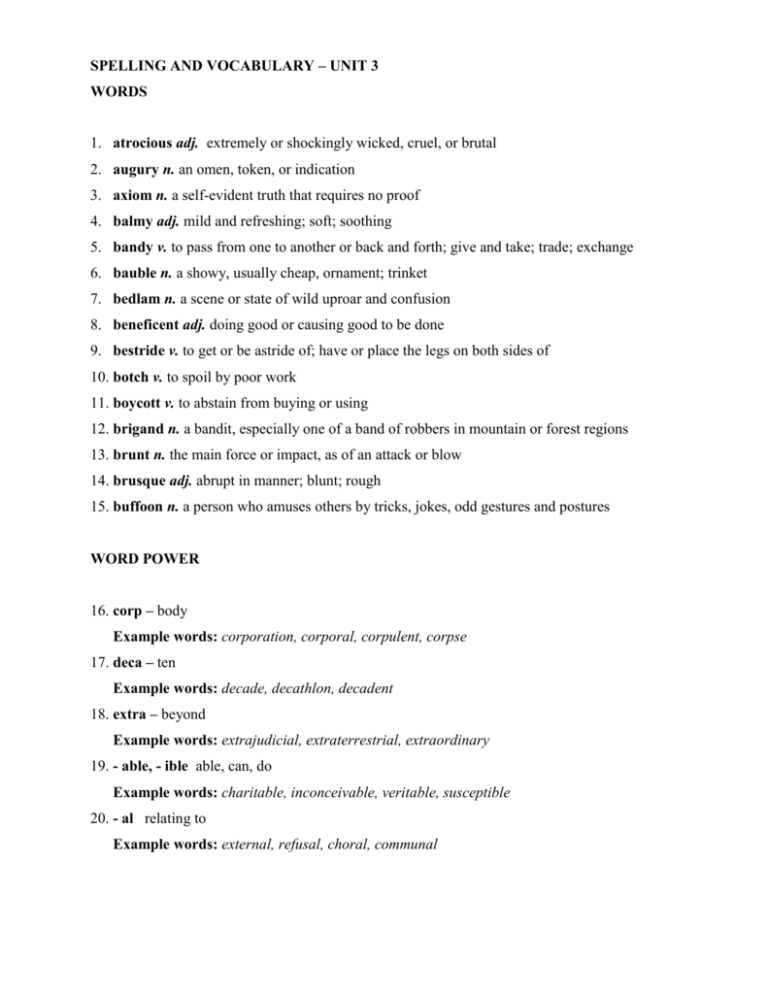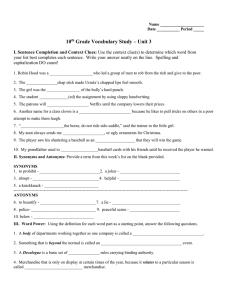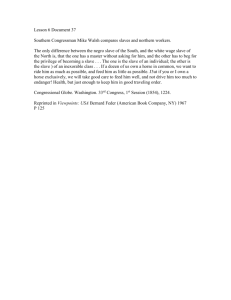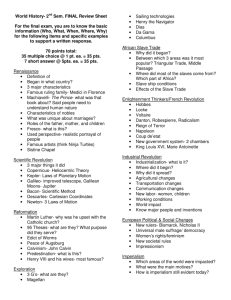Unit 3
advertisement

SPELLING AND VOCABULARY – UNIT 3 WORDS 1. atrocious adj. extremely or shockingly wicked, cruel, or brutal 2. augury n. an omen, token, or indication 3. axiom n. a self-evident truth that requires no proof 4. balmy adj. mild and refreshing; soft; soothing 5. bandy v. to pass from one to another or back and forth; give and take; trade; exchange 6. bauble n. a showy, usually cheap, ornament; trinket 7. bedlam n. a scene or state of wild uproar and confusion 8. beneficent adj. doing good or causing good to be done 9. bestride v. to get or be astride of; have or place the legs on both sides of 10. botch v. to spoil by poor work 11. boycott v. to abstain from buying or using 12. brigand n. a bandit, especially one of a band of robbers in mountain or forest regions 13. brunt n. the main force or impact, as of an attack or blow 14. brusque adj. abrupt in manner; blunt; rough 15. buffoon n. a person who amuses others by tricks, jokes, odd gestures and postures WORD POWER 16. corp – body Example words: corporation, corporal, corpulent, corpse 17. deca – ten Example words: decade, decathlon, decadent 18. extra – beyond Example words: extrajudicial, extraterrestrial, extraordinary 19. - able, - ible able, can, do Example words: charitable, inconceivable, veritable, susceptible 20. - al relating to Example words: external, refusal, choral, communal Name ______________________________ Date ___________________ Period _____ 10th Grade Vocabulary Study – Unit 3 I. Sentence Completion and Context Clues: Use the context clue(s) to determine which word from your list best completes each sentence. Write your answer neatly on the line. Spelling and capitalization DO count! 1. Robin Hood was a __________________________who led a group of men to rob from the rich and give to the poor. 2. The ________________________chap stick made Ursula’s chapped lips feel smooth. 3. The girl was the _________________________ of the bully’s hard punch. 4. The student _________________________(ed) the assignment by using sloppy handwriting. 5. The patrons will _________________________ Netflix until the company lowers their prices. 6. Another name for a class clown is a ___________________________ because he likes to pull tricks on others in a poor attempt to make them laugh. 7. “_______________________the horse, do not ride side-saddle,” said the trainer to the little girl. 8. My aunt always sends me __________________________, or ugly ornaments for Christmas. 9. The player saw his shattering a baseball as an ___________________ that they will win the game. 10. My grandfather used to _________________________baseball cards with his friends until he received the player he wanted. II. Synonyms and Antonyms: Provide a term from this week’s list on the blank provided. SYNONYMS 1. to prohibit - ____________________________ 2. a joker - ___________________________ 3. abrupt - _______________________________ 4. helpful - ___________________________ 5. a knickknack - __________________________ ---------------------------------------------------------------------------------------------------------------------ANTONYMS 6. to beautify - __________________________ 8. police- ____________________________ 7. a lie - _____________________________ 9. peaceful scene - _______________________ 10. below - ________________________________ III. Word Power: Using the definition for each word part as a starting point, answer the Following questions. 1. A body of departments working together as one company is called a ___________________. 2. Something that is beyond the normal is called a(n) _____________________________ event. 3. A Decalogue is a basic set of ________________________ rules carrying binding authority. 4. Merchandise that is only on display at certain times of the year, because it relates to a particular season is called ____________________________ merchandise. 5. If you had to decode the word incapable, what does the in- prefix mean? __________________; what does the suffix –able mean? _______________________________ IV. Reading Comprehension – Read the passage then answer the following questions. From My Bondage and My Freedom by Frederick Douglass The slave mother can be spared long enough from the field to endure all the bitterness of a mother’s anguish, when it adds another name to a master’s ledger, but not long enough to receive the joyous reward afforded by the intelligent smiles of her child. I never think of this terrible interference of slavery with my infantile affections, and in diverting them from their natural course, without feelings to which I can give no adequate expression. I do not remember to have seen my mother at my grandmother’s at any time. I remember her only in her visits to me at Col. Lloyd’s plantation, and in the kitchen of my old master. Her visits to me there were few in number, brief in duration, and mostly made in the night. The pains she took, and the toil she endured, to see me, tells me that a true mother’s heart was hers, and that slavery had difficulty in paralyzing it with unmotherly indifference. My mother was hired out to a Mr. Stewart, who lived about twelve miles from Old Master’s, and, being a field hand, she seldom had leisure, by day, for the performance of the journey. The nights and the distance were both obstacles to her visits. She was obliged to walk, unless chance flung into her way an opportunity to ride; and the latter was sometimes her good luck. But she always had to walk one way or the other. It was a greater luxury than slavery could afford, to allow a black slave mother a horse or a mule, upon which to travel twenty-four miles, when she could walk the distance. Besides, it is deemed a foolish whim for a slave mother to manifest concern to see her children, and, in one point of view, the case is made out—she can do nothing for them. She has no control over them; the master is even more than the mother, in all matters touching the fate of her child. Why, then, should she give herself any concern? She has no responsibility. Such is the reasoning, and such the practice. The iron rule of the plantation, always passionately and violently enforced in that neighborhood, makes flogging the penalty of failing to be in the field before sunrise in the morning, unless special permission be given to the absenting slave. “I went to see my child,” is no excuse to the heart of the overseer. Recalling Facts 1. Slave masters wanted slave women to ________. a. love their children. b. educate their children. c. have children 2. The narrator couldn’t recall his mother ________. a. visiting at his grandmother’s. b. ever visiting him. c. loving him. 3. The narrator saw his mother mostly _________. a. at night b. in the morning. c. during the summer. 4. The narrator’s mother worked for ________. a. herself b. Mr. Stewart c. Colonel Lloyd 5. The penalty for failing to show up for work on time was a. lost privileges. b. confinement. c. a flogging. Understanding the Passage 6. To the master, slave women were _______. a. unproductive b. completely helpless c. like farm animals 7. The narrator ________. a. accepted the conditions of slavery b. could barely control his rage c. never saw his mother 8. The narrator’s mother ________. a. truly loved him b. felt indifference towards him c. argued with the overseer 9. Slaves usually traveled by ________. a. horse b. mule c. foot 10. Overseers of slaves were __________. a. hardhearted b. well-meaning c. easily bribed .





